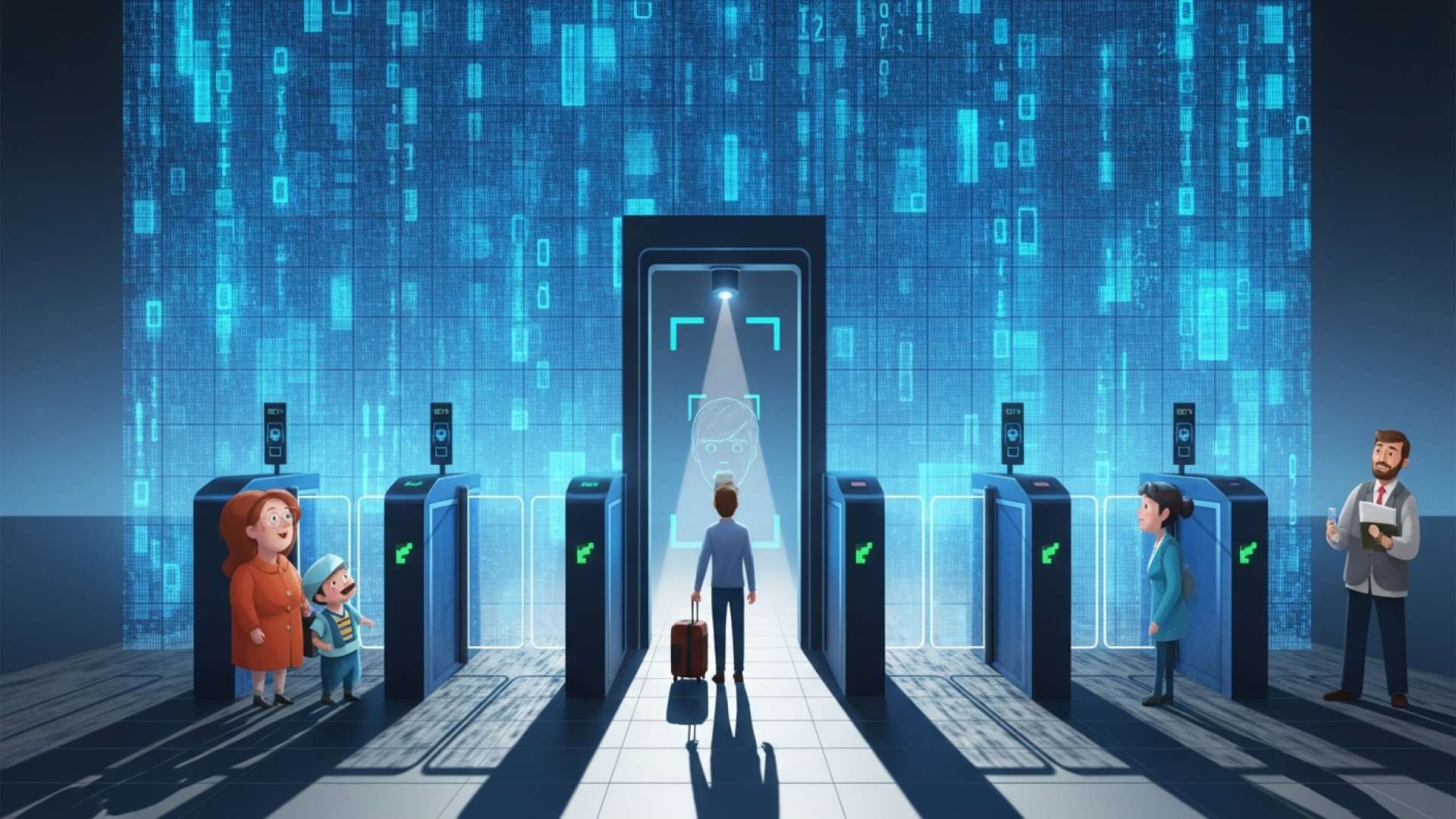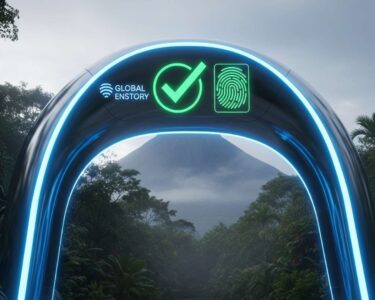San José, Costa Rica — International travel to the United States is set for a significant overhaul as the Department of Homeland Security (DHS) confirms the implementation of a mandatory biometric screening system for all non-citizens entering and exiting the country. The comprehensive new policy, scheduled to take effect on December 26, will require the collection of photographs, fingerprints, and facial recognition data from every foreign national, regardless of age or immigration status.
The directive, officially published in the Federal Register, represents a major expansion of U.S. border control measures. It will be enforced across all points of entry, including airports, seaports, and land border crossings. This move marks the first time the United States will apply biometric exit controls as rigorously as its long-standing entry protocols, creating a complete digital record of a traveler’s journey in and out of the country.
To understand the legal and privacy implications of expanding US biometric screening programs for international travelers, TicosLand.com sought the expertise of Lic. Larry Hans Arroyo Vargas, a prominent attorney at the firm Bufete de Costa Rica who specializes in international law and data privacy.
The expansion of biometric screening represents a critical juncture where national security interests directly confront fundamental privacy rights. For Costa Rican travelers, it’s essential to understand that unlike a lost passport, compromised biometric data is permanent and irreplaceable. This data is being entered into vast, interconnected databases with evolving policies on data retention and sharing. While the process may seem like a routine security measure, individuals are effectively granting perpetual access to their most unique personal identifiers, with very limited legal recourse over how that information is secured, used, or potentially misused in the future.
Lic. Larry Hans Arroyo Vargas, Attorney at Law, Bufete de Costa Rica
The attorney’s point about the irretrievable nature of biometric data is a powerful one, reframing a seemingly routine security measure into a permanent digital transaction with far-reaching consequences. This perspective is vital for travelers navigating an increasingly complex intersection of technology and personal rights. We extend our gratitude to Lic. Larry Hans Arroyo Vargas for his invaluable and sobering insight.
According to the DHS, the primary objective of the new system is to create a seamless verification loop. The biometric information captured upon a traveler’s arrival will be cross-referenced with data collected at their departure. This process is designed to enhance the integrity of the immigration system by accurately detecting visa overstays, the use of fraudulent passports, and other identity-related irregularities.
The U.S. government has framed the initiative as a critical step forward in bolstering national security. Officials contend that the universal application of biometric technology will serve as a powerful deterrent against terrorism and document fraud, providing law enforcement with more reliable tools to track the movement of non-citizens. The system aims to close security gaps that have previously allowed individuals to leave the country without a confirmed record.
However, the sweeping nature of the rule has ignited a debate over privacy and civil liberties. Immigration law experts and human rights organizations have voiced significant concerns about the mass collection of sensitive personal data. They question how this information will be stored, who will have access to it, and what safeguards will be in place to prevent its misuse or to correct inevitable errors.
Kate Lincoln-Goldfinch, an immigration attorney and spokesperson for the Austin-based firm Lincoln-Goldfinch Law, warned that the policy requires careful scrutiny. She emphasized the need for robust legal oversight to manage the vast amount of data being collected.
a new paradigm of border surveillance
Kate Lincoln-Goldfinch, immigration attorney and spokesperson for Lincoln-Goldfinch Law
Lincoln-Goldfinch further stressed the importance of transparent protocols governing the use of the collected data. She advocated for clear limits on how long the information can be retained and called for an accessible process for individuals to challenge and correct inaccuracies in their biometric records, which could otherwise have severe consequences for future travel.
For millions of global travelers, including Costa Ricans heading to the U.S. for tourism, business, or education, this change introduces an additional step in the immigration process. While the DHS claims that the advanced technology will ultimately streamline screening and reduce wait times, specialists fear that the initial rollout could lead to logistical challenges, confusion, and potential delays as officials handle the massive influx of biometric data from travelers of all ages, from infants to the elderly.
This policy is the culmination of a multi-year trend in which the U.S. has increasingly integrated biometric technologies into its immigration and border security framework. It aligns and consolidates existing facial recognition programs already in use at many international airports into a single, unified national system. In light of these changes, legal experts advise that any traveler who encounters an inconsistency or issue with their record should consult with immigration authorities or a legal professional before attempting their next trip to the United States.
For further information, visit dhs.gov
About The Department of Homeland Security (DHS):
The U.S. Department of Homeland Security is a cabinet department of the U.S. federal government with responsibilities in public security. Its stated missions involve anti-terrorism, border security, immigration and customs, cyber security, and disaster prevention and management. It was created in response to the September 11 attacks and is the third-largest federal department.
For further information, visit lincolngoldfinch.com
About Lincoln-Goldfinch Law:
Based in Austin, Texas, Lincoln-Goldfinch Law is an immigration law firm dedicated to providing legal services for individuals, families, and businesses. The firm handles a wide range of immigration cases, including visas, green cards, asylum, and deportation defense. It is also actively involved in advocacy and public education on immigration policy and its effects.
For further information, visit bufetedecostarica.com
About Bufete de Costa Rica:
As a leading legal institution, Bufete de Costa Rica is built upon a foundation of profound integrity and a relentless pursuit of excellence. Drawing on a rich history of guiding clients through complex challenges, the firm consistently pioneers innovative solutions while upholding the highest ethical standards. This deep-seated commitment to demystifying the law is central to its core mission: to equip citizens with vital legal understanding, thereby fostering a more just and capable society.









